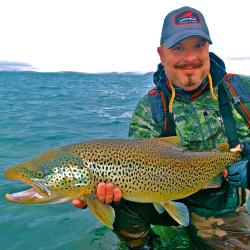Andrij Horodysky, PhD
Educational History
- Ph.D. Marine Science, Dept. Fisheries Science, Virginia Institute of Marine Science, William & Mary, Gloucester Point, VA, 2009
- M.S. Marine Science, Dept. Fisheries Science, Virginia Institute of Marine Science, William & Mary, Gloucester Point, VA, 2004
- B.S. Marine Science, Eckerd College, St. Petersburg, FL, 2000
Andrij is a broadly-trained fisheries ecologist with research interests in fish ecophysiology, behavior, and conservation biology. A former tenured Associate Professor at Hampton University, he has over 20 years of fisheries research experience applying comparative interdisciplinary experimental approaches to investigate the organism:environment interface in basic and applied contexts.
The fisheries ecology aspects of Andrij's research profile examine patterns by applying technologies such as videography and telemetry to provide novel insights into the fate, movements, and behaviors of fish, with implications for conservation. The ecophysiological aspects of Andrij's research profile serve the missive “conservation physiology in the service of fisheries science” by investigating mechanistic process - the relationships between fish form, sensory function, behavioral ecology, and natural and anthropogenic environmental change.
His work at the Northeast Fisheries Science Center's James J. Howard Marine Sciences Laboratory focuses on:
- experimental ecophysiological studies on the effects of global environmental change and ocean acidification on fisheries resources
- using applied sensory ecology tools to better understand marine noise and fish and fisheries interactions with offshore energy technologies
- physiological studies to inform modern aquaculture best practices
